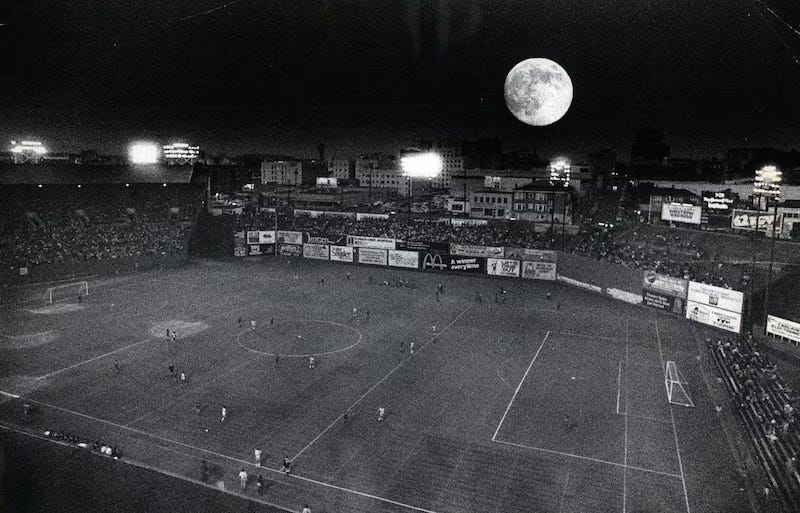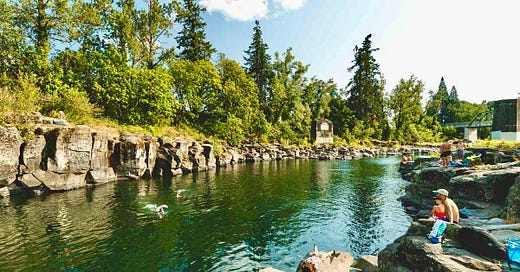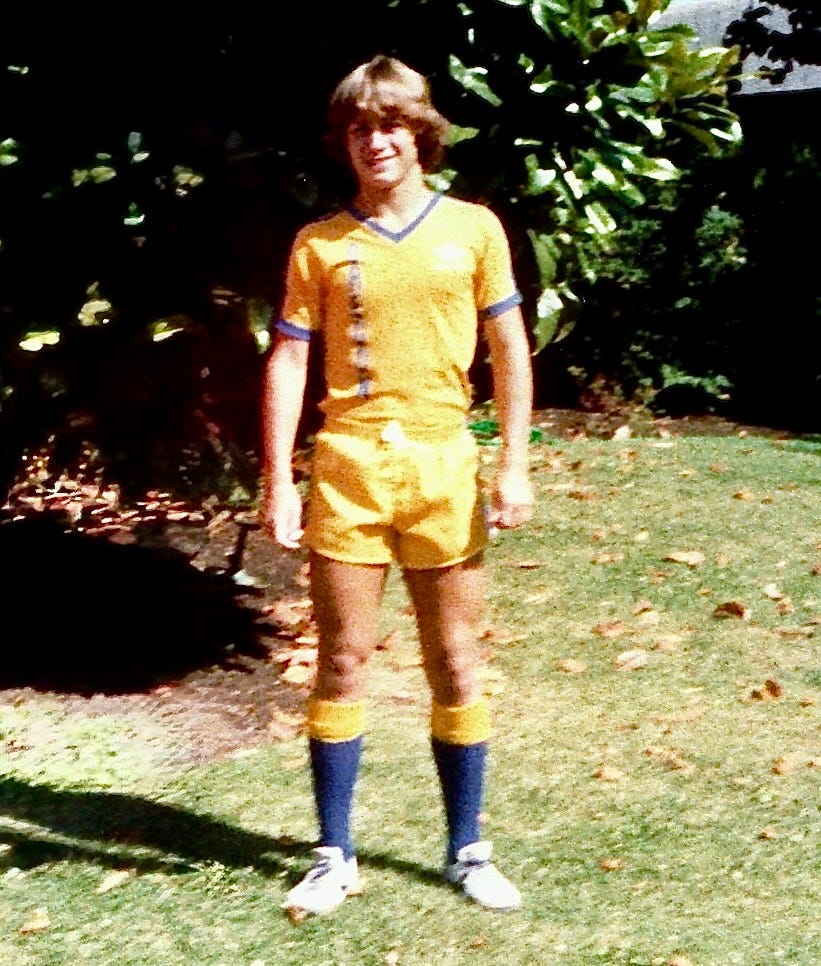Blast from my past
Something different from me: What we did in the suburbs way before cell phones and social media.
For this post, I had planned to sound off about the looming collapse of the American Experiment. From the White House, an oligarchical kleptocracy collaborating with racists and Christian nationalists is perpetrating an openly corrupt soft coup. Their lackeys can’t suck up hard enough. These attacks and offenses betray the democratic ideals this country was built on and our people have fought so hard and died for.
I don’t say this lightly. I have studied such movements in history and see all the dark signs. But others on Substack and elsewhere are describing it better and in precise detail right now. I write novels, after all.
So instead, I’m sharing a personal story published back in 2008. In the early 2000s, I wrote essays and short stories and tried getting them published. None were historical or thrillers like I write now.
In “Trimet Summer,” I wrote about what we teens did in the remote SE suburbs of Portland, Oregon, well before social media, cell phones, and helicopter parents. Back then, we just used our imaginations, tried to be good, and somehow made it home by dinner. Wise policies here in my home state helped make it possible. It all seems a lost world, especially now.
I hope you enjoy it.
Trimet Summer
No one said we couldn’t take a river raft on the bus. Two TriMet bus seats barely held the scruffy yellow rubber, all deflated and folded and crammed in there. We grasped at the metal seat handles, peering out windows. Then we’d catch a glimpse of it — the Clackamas River, a vast sparkling sheet beyond cropland and lines of pines.
It was summer, 1980. We had four for this river run, four teen boys from the same tame subdivision of Milwaukie suburbia. The bus driver dropped us off at Carver. Along with the raft we had a sack of cans and bottles. At Carver Store we returned the booty — and stocked up on jerky and sunflower seeds from the payoff. We pumped up the raft with the store’s air hose, shouldered the raft across Carver Bridge and on down to the boat ramp, where the river’s edge had two smells — the fresh scent of rushing current, and the musty reek of water that would not rush.
In a short half hour TriMet bus 31 had delivered us, while our parents worked, into something wilder and freer. We were too young to drive, which definitely was not cool, but TriMet didn’t judge. Our allowances sucked and our crappy first jobs paid little more, but the Oregon Bottle Bill had us covered.
We did a lot of those river runs. We’d have anywhere from two to six of us (me, my brother Dave, Andy, Kelley, Brubaker, Travis, or some special guest star), there could’ve been inner tubes or air mattresses (easier to lug on the bus), and it might have been the summer of ‘79, ‘81 or even ‘82. The ritual remained the same. Floating that short stretch of the Clackamas offered the geography of the world, it seemed then — rocky cliffs, sandy shore, low valley of horses there, bank of river rocks here, then clay plateaus, then overlooks with majestic houses and, in-between, trees and trees with moss on trunks, the high noon sun painting it all in vivid browns, greens, grays and blues. Sometimes it was even flesh tones — if we were lucky we’d pass some “fox” on a towel or lawn chair. I remember aromas of suntan lotion and wild berries, that salty, piney taste of our sunflower seeds. Stop at a rope swing. Jump from a rock. Take the fast rapid again, and again, knocking ankles on river rocks as we plowed back upstream for another go. We might drift without seeing a soul, legs dangling off the side. I don’t remember litter.
Sometimes we scored a six-pack. I don’t know how four teen wannabe river rats riding the bus managed that one. I do know I drank my first beer on the river — a Mickey’s Big Mouth in the stout green bottle, like a grenade. I can still taste the warm bitterness of it, like liquid shrubs. Yet we never got drunk. We could only carry — or score — so much and had to make it last. We didn’t smoke pot then. It just wasn’t us. We weren’t stoners or even nerds — we were soccer players, a new breed spontaneously created a few years hence by the North American Soccer League and a tricky little dude named Pelé.
We played morning and night on nearby fields, in backyards, on concrete hoop courts, before and after anything we were told to do. Yet we weren’t jocks — back then, soccer had the same clout as flag team or ping-pong. Only we seemed to know that nylon soccer shorts dried way faster on the river than denim cutoffs.
The river float let us be ourselves, but the ride had to end. Riverside was the safe jump-off point, a sleepy park with a kids’ BMX track and a soccer field we all knew. If we wanted a longer ride we had to stop at High Rocks farther down, near Gladstone and the Willamette River. When High Rocks got close a hulking old rail bridge blocked the sun, its massive supports sucking and churning the water, working hard to make us steelhead bait. Then those jagged high rocks loomed, like mini black Alps.
The regulars glared down at us, looking to me like the Manson family with their tattoos and leather headbands, gaunt pocked cheeks and knives and furry shit hanging from their belts, the women stomping around all the while like infantry on patrol. Here the darker 1970s still ruled, all Motörhead and Jonestown and the Gypsy Jokers, when tattoos and Harleys were not stale brands but weapons. The Mansons leapt from any rock, from any height, without even looking it seemed. It was Land of the Lost and Planet of the Apes, we joked, but we had to know it was within us too. They were daring us to jump.
After braving High Rocks, we could do anything. On weekends that same TriMet bus 31 delivered us to downtown’s Civic Stadium and the Portland Timbers of the North American Soccer League (NASL). We’d take back bottles and always get downtown early. At Caplans Sports we’d try on the rare Mitre and Patrick soccer shoes we couldn’t ever afford. At Callin Novelties we’d buy whoopee cushions and fake turds on sale. We scarfed at mom-and-pop joints, lots of bad tacos and cheap hot dogs, and we amazed at Django’s Records and the endless stocks of used LPs that nowadays couldn’t fill one colored room of Powell’s or a page of Amazon.
Along the march to Civic we eyed girls but rarely made successful contact. Maybe it was because we were to them young Mansons from the far-out, pre-New Wave suburbs. And maybe it was best, for we had no clue what to say. Ever rafted the Clackamas? Listen to that band Devo? Hear my whoopee cushion? Inside the stadium, we found our way. A few times we snuck down to the field’s edge for a Timbers game’s last minutes. In 1979, we sat along the midfield touchline as our boys lost to the mighty New York Cosmos in a shootout.
After games, the stadium crew often let us soccer rats play on the hard Astroturf until after the lights died down. Once we made it below the westside stands and mingled with players coming out the locker rooms with cigarettes and beers and so many British accents twanging away, none of which we could match to a town or even a country. For one big game we brought our small one-man raft on the bus and, branding it the “Timber Boat,” blew it up and sent it out into the Timbers’ crowd, a kooky teen bonding of river and city. It floated out among the North End’s thousands and can probably be seen, I’m really hoping, in a decent photo somewhere.

That was our Soccer City USA. We never ventured into Old Town, Chinatown, or that dead zone of grimy warehouses now called The Pearl. Like most kids, we took it all for granted. We had no clue downtown’s smaller blocks (compared to other American cities’) helped make that trek to the stadium quick and easy. For us, the Transit Mall and Fareless Square had always been there even though they were only a couple years old. We didn’t care much about Pioneer Courthouse Square being built, about some trolley they were calling MAX.
As for the Clackamas River, I certainly had no clue Rudyard Kipling had fished at Carver and they’d named a big rock in the river after him, had no clue endangered coho salmon and steelhead swam nearby Clear Creek and that only years of activism, conservation and grit had brought the noble fish back. The Oregon Bottle Bill was barely ten years old then. I only vaguely thought of it as recycling and probably didn’t see that our returns helped keep the litter off the river.
We were just getting started, yet nothing was what it seemed. The Mansons at High Rocks were partly grotesque exaggerations of my overheating teen mind, and I’m sure the scene was nothing like the psycho summer river riots reported today. At the same time, a grinning contender named Neil Goldschmidt was still the untainted champion of progress Portland, Oregon-style, and the Trail Blazers were those humble scrapping heroes we loved all the more because the national media snubbed them.
Out by my house, Clackamas Town Center was about to change a loose two-lane network of sleepy fringe suburbs, farmland and woods into a supersized morass of chain mall, road improvement and mini-mansion that would scrape the green from the hills and, in the end, seduce even old isolationist Happy Valley.
We were those teens who thought themselves different. We’d find out otherwise. Soon we’d get our first cars and loathe the bus, the summer river runs involving complex car shuttles, and more crappy jobs freed us from taking back bottles. Along the river, I’d hope to see that one girl who’d dropped out instead of just some fox. Shorties of Schlitz Malt Liquor would replace sips of Mickey’s, whoopee cushions became bongs, Devo abandoned for Black Flag. Though I’d become a top soccer player locally I quit top-level ball before I turned 19, the collapse of the cocky, overreaching NASL doing my teen malaise no favors at all.
Those easy summers made possible by TriMet and the Oregon Bottle Bill were not to blame. If anything they were character builders that would help us remember later we could make it all on our own — with just a little help. It’s not often you can thank policy for encouraging growth of a human sort. Today, it might be phrased this way: There’s a lot to be said for unstructured play.
Of course, my parents Carl and Jean knew it all along. Did they know their sons were hauling a smelly rubber raft on TriMet to float the big river and taking back bottles like a “hobo” to roam the raw city? I think so. To brave the dark sight of Gypsy Jokers and the ridicule of downtown westside girls? They had to have a clue. My parents were happy to let TriMet and the Bottle Bill give us a better summer while they worked, for us. That’s because Carl and Jean, much older than most kids’ parents, were true children of the Great Depression. They knew a damn good New Deal when they saw one.
***
First published in Citadel of the Spirit: Oregon’s Sesquicentennial Anthology, Nestucca Spit Press, 2008.
Trimet Summer is also available in my free ebook titled Underheroes, a DIY compilation of eight fiction shorts and two essays published in the early 2000s when I was writing as “Stephen F. Anderson.” You can get it as a download here.
I hope you’re doing well. Hang in there, take care of yourselves, and always be prepared to resist.
Steve






Great coming-of-age story, Steve!
Wow, Steve. What great memories of fun and I can see it all in my mind.